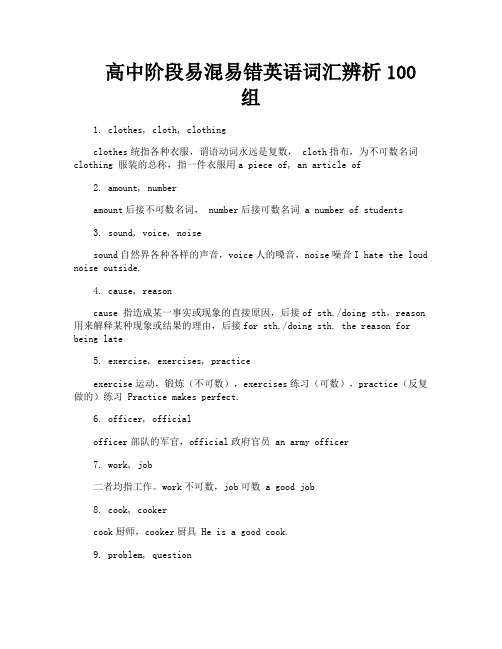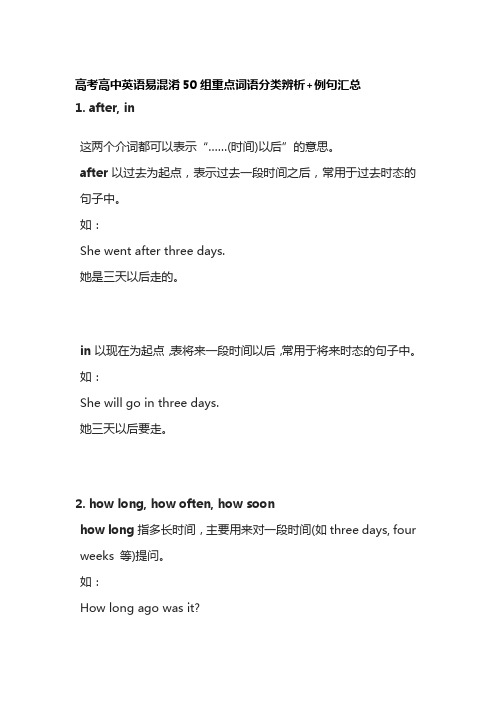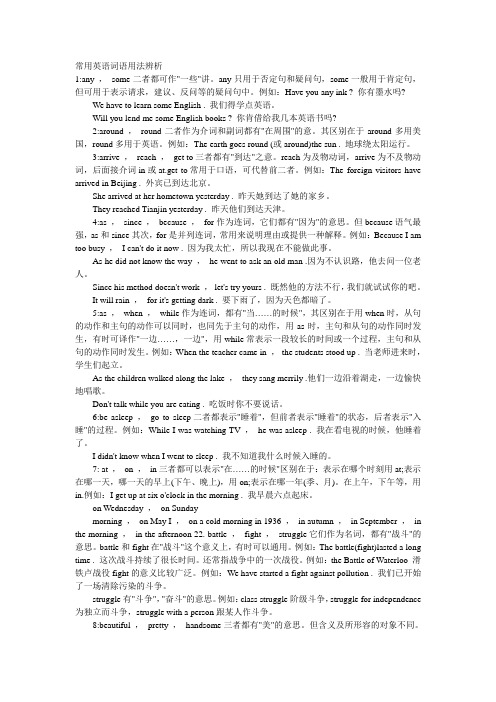高中英语常用词汇辨析
高中英语知识点归纳词汇词义辨析与用法记忆

高中英语知识点归纳词汇词义辨析与用法记忆在高中英语学习中,词汇是一个非常重要的部分。
掌握词汇的词义辨析与用法,对于提高英语水平起着至关重要的作用。
本文将归纳总结高中英语中常见的词汇知识点,并讲解其词义辨析与用法,帮助学生更好地记忆和应用这些词汇。
一、名词的词义辨析1. issue与problem的区别Issue通常指的是一个广泛的问题或争议,重点在于讨论或解决这个问题。
而problem则更具体,强调的是一个具体的困难或难题。
例如:We need to address the issue of climate change.(我们需要解决气候变化的问题。
)I have a problem with my computer.(我的电脑出了问题。
)2. job与work的区别Job指的是一份工作,可以是固定的、有报酬的,也可以是临时的、无报酬的。
而work则是指在工作中所进行的具体活动或任务。
例如:He has a full-time job as a teacher.(他有一份全职教师的工作。
)I have a lot of work to do today.(我今天有很多工作要做。
)3. advice与advise的区别Advice是名词,指的是建议或忠告。
而advise是动词,表示给予建议或忠告。
例如:I need some advice on how to study effectively.(我需要一些关于如何有效学习的建议。
)Can you advise me on which restaurant to choose?(你能给我一些建议,帮我挑选餐厅吗?)二、动词的用法记忆1. make与do的用法区别Make一般指制造、构建或创造,强调创造性的行为。
而do则是一个更加普遍的动作,指的是完成任务或活动。
例如:He made a beautiful sculpture.(他制作了一座漂亮的雕塑。
高中英语词汇辨析

高中英语词汇辨析高中英语学习中,词汇的辨析是非常重要的一环。
因为英语单词之间经常存在一字之差但意义不同的情况,所以我们在学习和应用词汇时一定要确保选择正确的词汇。
接下来,本文将详细介绍几组常见的高中英语词汇辨析,帮助同学们更好地区分它们之间的区别。
1. Memory vs. RemembranceMemory和Remembrance都表示“记忆”,但二者用法略有不同。
Memory通常指的是对于已经发生的事情或拥有的知识的记忆;而Remembrance则更偏向于对于过去事件或人物的怀念、纪念。
例如:- I have a good memory of my childhood.(我对童年有个好记忆。
)- We gather here today in remembrance of those who sacrificed their lives.(我们今天在此聚集,以纪念那些献出生命的人。
)2. Realize vs. NoticeRealize和Notice都有“意识到”的意思,但是它们的使用场景和语气略有不同。
Realize通常指的是对于一个事实或情况的认识和理解,带有一定的深度和思考;而Notice则更多地指察觉到某个事物或细节的存在。
例如:- I didn't realize how important family was until I moved away from home.(我离开家之后才意识到家庭的重要性。
)- Did you notice the new painting on the wall?(你注意到墙上的新画了吗?)3. Lend vs. BorrowLend和Borrow都表示“借”的意思,但它们的动作发起方和接收方不同。
Lend指的是将物品借给他人;而Borrow则表示向他人借取物品。
例如:- Can you lend me your pen? I forgot mine.(你能借给我你的钢笔吗?我的忘带了。
高中阶段易混易错英语词汇辨析100组

高中阶段易混易错英语词汇辨析100组1. clothes, cloth, clothingclothes统指各种衣服,谓语动词永远是复数, cloth指布,为不可数名词clothing 服装的总称,指一件衣服用a piece of, an article of2. amount, numberamount后接不可数名词, number后接可数名词 a number of students3. sound, voice, noisesound自然界各种各样的声音,voice人的嗓音,noise噪音I hate the loud noise outside.4. cause, reasoncause 指造成某一事实或现象的直接原因,后接of sth./doing sth,reason 用来解释某种现象或结果的理由,后接for sth./doing sth. the reason for being late5. exercise, exercises, practiceexercise运动,锻炼(不可数),exercises练习(可数),practice(反复做的)练习 Practice makes perfect.6. officer, officialofficer部队的军官,official政府官员 an army officer7. work, job二者均指工作。
work不可数,job可数 a good job8. cook, cookercook厨师,cooker厨具 He is a good cook.9. problem, questionproblem常和困难连系,前面的动词常为think about, solve, raise,question常和疑问连系,多和ask, answer连用10. a number of, the number ofa number of许多,谓语动词用复数。
高考高中英语易混淆50组重点词语分类辨析+例句汇总

高考高中英语易混淆50组重点词语分类辨析+例句汇总1. after, in这两个介词都可以表示“……(时间)以后”的意思。
after以过去为起点,表示过去一段时间之后,常用于过去时态的句子中。
如:She went after three days.她是三天以后走的。
in以现在为起点,表将来一段时间以后,常用于将来时态的句子中。
如:She will go in three days.她三天以后要走。
2. how long, how often, how soonhow long指多长时间,主要用来对一段时间(如three days, four weeks 等)提问。
如:How long ago was it?这是多久前的事了?how often指每隔多久,主要用来对频率副词或状语(如once a week等)提问。
如:—How often does he come here? —Once a month.他(每隔)多久来一次?每月一次?how soon指再过多久,主要用来对表示将来的一段时间(in an hour, in two weeks 等)提问。
如:How soon can you come?你多快能赶来?3. few, a few, little, a little, several, somefew 和little的意思是否定的,表示“很少”或“几乎没有”;而a few和a little的意思是肯定的,表示“有一些,有一点儿”。
few 和a few修饰可数名词;little 和a little 修饰不可数名词。
several用于修饰可数名词,语意比a few和some更肯定,含有“好几个”的意思。
some可修饰可数名词,也可修饰不可数名词,从数量上说,它有时相当于a few 或a little,有时指更多一些的数量。
4. the other, anotherthe other指两个人或事物中的“另一个”,表示特指。
高中英语重点词汇、词组辨析(非常好)

高中英语重点词汇、词组辨析1.above all, after all, at all, in allabove all表示“最重要,首先”,常置于句首或句中,作插入语,起强调作用。
Above all, we have won the game.after all表示“毕竟,终究,终归,到底”,在句中位置较灵活。
Jessica has turned out to be a nice girl after all.at all表示“根本”。
I don’t like Mexican food at all.in all表示“总共”,既可放在句首,也可放在句末。
We have learned 2500 English words in all.2. accept, receiveaccept表示“接受”的意思,是有意识的。
I’ve received a gift from him, but I’m not going to accept it. receive表示“收到”的意思,是无意识的。
Did you receive any letters today?3. add, add to, add...to, add up toadd表示“增加,添加,计算……总和,补充说”。
If the water is too cold, add some more hot water.add to表示“增添,增加,增进”。
The heavy snow added to our difficulties.add...to表示“把……加到……”。
Add ten to forty, and you will get fifty.add up to表示“合计达到”,该短语不用于被动语态。
All his school education added up to no more than one year.4. admit sb./sth. to..., admit of, admit toadmit sb./sth. to表示“……允许某人或某物进入某处”。
常用英语词语用法辨析

常用英语词语用法辨析1:any ,some二者都可作"一些"讲。
any只用于否定句和疑问句,some一般用于肯定句,但可用于表示请求,建议、反问等的疑问句中。
例如:Have you any ink ? 你有墨水吗?We have to learn some English . 我们得学点英语。
Will you lend me some English books ? 你肯借给我几本英语书吗?2:around ,round二者作为介词和副词都有"在周围"的意。
其区别在于around多用美国,round多用于英语。
例如:The earth goes round (或around)the sun . 地球绕太阳运行。
3:arrive ,reach ,get to三者都有"到达"之意。
reach为及物动词,arrive为不及物动词,后面接介词in或at.get to常用于口语,可代替前二者。
例如:The foreign visitors have arrived in Beijing . 外宾已到达北京。
She arrived at her hometown yesterday . 昨天她到达了她的家乡。
They reached Tianjin yesterday . 昨天他们到达天津。
4:as ,since ,because ,for作为连词,它们都有"因为"的意思。
但because语气最强,as和since其次,for是并列连词,常用来说明理由或提供一种解释。
例如:Because I am too busy ,I can't do it now . 因为我太忙,所以我现在不能做此事。
As he did not know the way ,he went to ask an old man .因为不认识路,他去问一位老人。
高中英语知识点辨析

高中英语知识点辨析1.because of意为"因为,因为",强调因果关系,在句中仅作状语,修饰句中的一部分,与其他成分不用逗号隔开。
如:We must not get discouraged because of such a minor setback.我们决不可因为这样一个小小的挫折而灰心丧气。
2.owing to与because of一样,也强调因果关系,除作状语外,也可作表语。
作状语时修饰整个句子,可在句首或句末,用逗号隔开。
如:They decided to cancel the flight,owing to the storm.因为这场暴风雨,他们决定取消航班。
His death was owing to an accident.他死于一场事故。
3.due to引出造成后果的原因,在句中作表语、状语和定语。
作表语和状语时与owing to 同义,作状语时,一般不与其他成分隔开。
如:This accident was due to(owing to)his careless driving.这次车祸是因为他开车疏忽大意造成的。
He arrived late due to(owing to)the storm.因为暴风雨他来晚了。
Mistakes due to carelessness may have serious consequences.因为疏忽大意造成的错误可能带来严重的后果。
4.thanks to表示"幸亏,多亏"多用于表达正面意思,相当于感谢,在句中作状语和表语。
如:Thanks to your advice,much trouble was saved.多亏你的建议,减少了很多麻烦。
一、只能修饰可数名词的词语有:many, many a(n), a good / great many, a (great / large) number of, scores of, dozens of等。
英语完形填空高考备考----词汇(同义词辨析)

高中常用同义词辨析汇总1. a good/great many(of)/a number of/a large quantity of/plenty of/a large amount of/a great deal of2. a number of/numbers of/the number of. . .3. abandon/desert4. abolish/cancel5. above all/first of all/at first6. accuse/charge/blame/scold7. acquire/obtain/gain/win/earn8. adjust/adapt9. adopt/adapt10. agreement/contract/bargain11. also/too/either/as well/besides/moreover12. anxious/eager/keen13. apart from/except/except for/except that/besides14. argue/debate/discuss/quarrel15. ashamed/shameful/shame16. at ease/with ease17. attempt/try/manage18. attend/join/join in/take part in/participate in19. average/common/ordinary/general/usual20. award/reward/prize21. beat/strike/hit22. because of/owing to/thanks to/due to23. before/since/until24. blame/condemn/scold25. bother/interrupt/trouble/disturb26. break into/break in27. burden/load28. calm/still/quiet/silent29. care about/care for30. cause/reason31. celebrate/congratulate/observe32. certain/sure33. choose/select/elect/pick34. close/closely35. come about/happen/take place/occur/break out36. come to power/be in powere true/realize38. common/ordinary/usual/average/universal39. compare/contrast40. conflict/fight/war/struggle41. confuse/puzzle42. consequently/so43. considerate/thoughtful44. constant/continual/continuousv1.0 可编辑可修改continuous adj. 不停的,连续不断的。
- 1、下载文档前请自行甄别文档内容的完整性,平台不提供额外的编辑、内容补充、找答案等附加服务。
- 2、"仅部分预览"的文档,不可在线预览部分如存在完整性等问题,可反馈申请退款(可完整预览的文档不适用该条件!)。
- 3、如文档侵犯您的权益,请联系客服反馈,我们会尽快为您处理(人工客服工作时间:9:00-18:30)。
高中英语常用词汇辨析高中英语常用词汇辨析1. clothes, cloth, clothingClothes统指各种衣服,谓语动词永远是复数:cloth指布,为不可数动词:clothing为服装的总称,指一件衣服用a piece of clothing, an article of clothing2. incident, accidentIncident指小事件:accident指不幸的事故3. amount, numberAmount后接不可数名词:number后接可数名次:如:a number of students4. family, house, homeHone家,包括住处和家人:house房子,住宅:family家庭成员,如:My family is a happy one.5. sound, voice, noisesound自然界各种各样的声音:voice人的嗓音:noise噪音,如:I hate the loud noise outside.6. photo, picture, drawingPhoto用照相机拍摄的照片:picture可指相片,图片,电影片:drawing 指画的画7. vocabulary, wordVocabulary词汇,一个人拥有的单词量:word具体的单词8. population, peoplePopulation人口,人数:people具体的人9. weather, climateWeather一天内具体的天气状况:climate长期的气候状况10. road, street, path, wayroad具体的公路,马路:street街道:path小路,小径:way道路,途径11. course, subjectCourse课程(可包括多门科目):subject科目(具体的学科),如: a summer course12. course, habitcustom传统风俗,习俗,也可指生活习惯,后接to do: habit生活习惯,习惯成自然,后接of doing13. cause, reasoncause制造成某一事实或现象的直接原因,后接of sth./doing sth.: reason用来解释某种现象或结果的理由,后接for sth./doing sth. 如:the reason for being late14. exercise, exercises, practiceExercise运动,锻炼(不可数):exercises练习(可数):practice(反复做的)练习,如:Practice makes perfect.15. class, lesson作“课”解时,两者可以替换。
指课文用lesson,指班级或全体学生用class,如:lesson 6; class 516. speech, talk, lectureSpeech指在公共场所所作的经过准备的较正式的演说:talk日常生活中的一般的谈话,讲话:lecture学术性的演讲,讲课,如:a series of lecture on…17. officer, officialOfficer部队的军官:official政府官员,如:an army officer18. work, job二者均指工作。
Work不可数;job可数,如:a good job19. couple, pairCouple主要指人或动物:pair多指由两部分组成的东西,如:a pair of trousers20. country, nation, state, landCountry侧重指版图,疆域:nation指人民,国民,民族:state侧重指政府,政体;land国土,国家21. cook, cookercook厨师:cooker厨具,如:He is a good cook.22. damage, damagesDamage不可数名词,损害,损失;damages复数形式,赔偿金23. police policemanpolice警察的总称,后接复数谓语动词:policeman指某个具体的警察24. problem, questionProblem常和困难练系,前面的动词常为think about, solve, raise: question常和疑问连系,多和ask, answer连用25. man, a manMan人类:a man一个男人26. chick, chicken二者均可指小鸡,chicken还可以当鸡肉。
27. telegram, telegraph当电报解时,telegram指具体的,telegraph指抽象的,如:a telegram , by telegraph28. trip, journey, travel, voyageTravel是最常用的;trip指短期的旅途;journey指稍长的旅途;voyage 指海上航行;如:a three-day trip29. sport, gameSport多指户外的游戏或娱乐活动,如打球,游泳,打猎,赛马等;game指决定胜负的游戏,通常由一套规则30. price, prizePrice价格;prize奖,奖品,奖金31. a number of, the number ofA number of许多,谓语动词用复数;the number of指“……的数目”,谓语动词用单数。
32. in front of, in the front ofIn front of范围外的前面;in the front of范围内的前面,如:In the front of the room sits a boy.33. of the day, of a dayOf the day每一天的,当时的,当代的;of a day暂时的,不长久的34. three of us, the three of usThree of us我们(不止三个)中的三个;the three of us我们三个(就三个人)35. by bus, on the busBy bus表手段,方式,不用冠词;on the bus表范围36. for a moment, for the momentFor a moment片刻,一会儿;for the moment暂时,一时37. next year, the next yearNext year将来时间状语;the next year过去将来时间状语38. more than a year, more than one yearMore than a year一年多;more than one year超过一年(两年或三年等)39. take advice, take the (one’s) adviceTake advice征求意见;take the advice接受忠告40. take air, take the airTake air传播,走漏;take the air到户外去,散步41. in a word, in wordsIn a word总之,一句话;in words口头上,如:In a word, you are right 42. in place of, in the place ofIn place of代替;in the place of在……地方43. in secret, in the secretIn secret秘密地,暗自地,偷偷地,一般作状语;in the secret知道内情,知道秘密,一般用作表语44. a girl, one girlA girl可泛指所有女孩;one girl一个女孩45. take a chair, take the chairTake a chair相当于sit down坐下;take the chair开始开会46. go to sea, by sea, by the seaGo to sea当海员,出航;by sea乘船,由海路;by the sea在海边;如:go by sea47. the doctor and teacher, the doctor and the teacherthe doctor and teacher指一个人,既是医生又是老师;the doctor and the teacher两个人,一个医生和一个老师48. in office, in the officeIn office在职的;in the office在办公室里,如:He is in office, not out of office49. in bed, on the bedIn bed卧在床上;on the bed在床上50. in charge of, in the charge ofIn charge of管理,负责照料;in the charge of由……照料51. in class, in the classIn class在上课;in the class在班级里52. on fire, on the fireOn fire着火;on the fire在火上53. out of question, out of the questionOut of question毫无疑问的;out of the question不可能的54. a second, the secondA second又一,再一;the second第二55. by day, by the dayBy day白天;by the day按天计算56. the people, a peopleThe people指人;a people指民族57. it, oneIt同一物体;one同类不同一58. that, thisThat指代上文所提到的;this导出下文所要说的59. none, nothing, no oneNone强调有多少;nothing,no one强调有没有,nothing指物,no one 指人;如:A : how many…/how much…?B : none60. anyone, any oneAnyone指人,不能接of ;any one指人物均可,可接of,如:any one ofyou61. who, whichWho指姓名或关系;what指职业或地位,如:What is your dad? He isa teacher.62. what, whichwhat的选择基础是无限的;which在一定范围进行选择63. other, anotherOther后接名词复数;another后接名词单数;如:other student, another student64. not a little, not a bitNot a little非常not a bit一点也不65. many, much, a lot ofMany和可数名词连用;much和不可数名词连用;a lot of可数、不可数均可,但不用于否定句66. much more…than, many more…thanMuch more…than后接形容词或不可数名词;many more…than后接可数名词;如:many more people, much more water, much more beautiful67. no, notNo=not a/any; 如:no friend=not a/any friend; no water =not any water 68. no more than, not more thanNo more than相当于only,仅仅,只有;not more than至多,不超过Majority只能修饰可数名词;most可数不可数均可;如:the majority of people70. by oneself, for oneself, to oneself, of oneselfBy oneself单独的,独自的;for oneself为自己;to oneself供自己用的71. at all, after allAt all根本,全然;after all 到底,毕竟72. tall, highTall常指人或动物;high常指物体73. fast, quicklyFast侧重于指人或物体具有运动速度快的特点;quickly侧重于指某事完成或发生得快;如:run fast, answer the question quickly74. high, highlyHigh具体的高;highly抽象的高,高度的;如:think highly of75. healthy, healthfulhealthy健康的,健壮的;healthful有益于健康的,如:healthful exercise 76. sleeping, asleep, sleepySleeping正在睡觉;asleep睡着,熟睡,只能做表语;sleepy困的,有睡意的;如:a sleeping baby, the b aby is asleep, I’m sleepy77. gold, goldenGold指真金制品,如:a gold ring : golden只金色的,但金鱼用gold fishMost用于表感受的肯定句中,相当于very,当“大部分,大多数”解时是形容词或名词;mostly大部分,是副词;如:most people, the people are mostly…79. just, veryjust表强调时是副词,作状语;very表强调时是形容词,用作定语;如:the very man, just the man80. wide, broadWide侧重于一边到另一边的距离;broad侧重于幅面的宽广;如:broad shoulders81. real, truereal真的,真实的,指的是事实上存在而不是想象的;true真的,真正的,指的是事实和实际情况相符合;如:real gold, a true story 82. respectful, respectablerespectful尊敬,有礼貌;respectable可敬的,值得尊敬的;如:be respectful to the aged83. outwards, outward二者均可用作副词,表示向外,外面,outward还可用作形容词,如:an outward voyage84. pleasant, pleased, pleasingpleasant常用作定语;pleased, pleasing常用作表语,pleased主语常为人,pleasing主语常为物;如:an pleasant trip, The trip is pleasing85. understanding, understandableunderstanding明白事理的,能体谅的:understandable可理解的,能够懂的;如:an understanding girl, an understandable mistake86. close, closelyclose接近,靠近;closely紧紧地,紧密的;如:closely connected, stand close87. ill, sickIll作表语;sick定语、表语均可,如:a sick boy88. good, wellGood形容词;well副词,但指身体状况是形容词,如:He is well again 89. quiet, silent, stillquiet安静的,可以发出小的声音;silent不发出声,但可以动;still 完全不动,完全无声响90. hard, hardlyHard努力;hardly几乎不91. able, capableAble与不定式to do连用;capable与of连用92. almost, nearly而致君为“几乎,差不多”,和否定词连用时用almost,如:almost nobody93. late, latelylate迟,晚;lately最近,近来,如:I haven’t seen him lately94. living, alive, live, livelyliving, alive, live均为活着的;living定表均可;alive定表均可,定语后置;live只能做定语;lively意为活泼的;如:all the living people=all the people alive95. excited, excitingExcited使人兴奋的;exciting令人兴奋的;如:I’m excited. The news is exciting.96. deep, deeplyDeep具体的深;deeply抽象的深,深深地;如:deeply moved, dig deep 97. aloud, loudAloud出声地;loud大声地;如:read loud98. worth, worthy二者均为值得,worth后接doing; worthy后接to be done, of be done;如:It is worth visitin g=It’s worthy to be visited=It’s worthy of being visited99. bad, badlyBad形容词,如:go bad; badly副词,不好,但与need, want, require 连用为“很,非常”,如: I need the book badly.100. before long, long beforeBefore long 不久以后;long before很久以前;如:not longbefore=before long。
